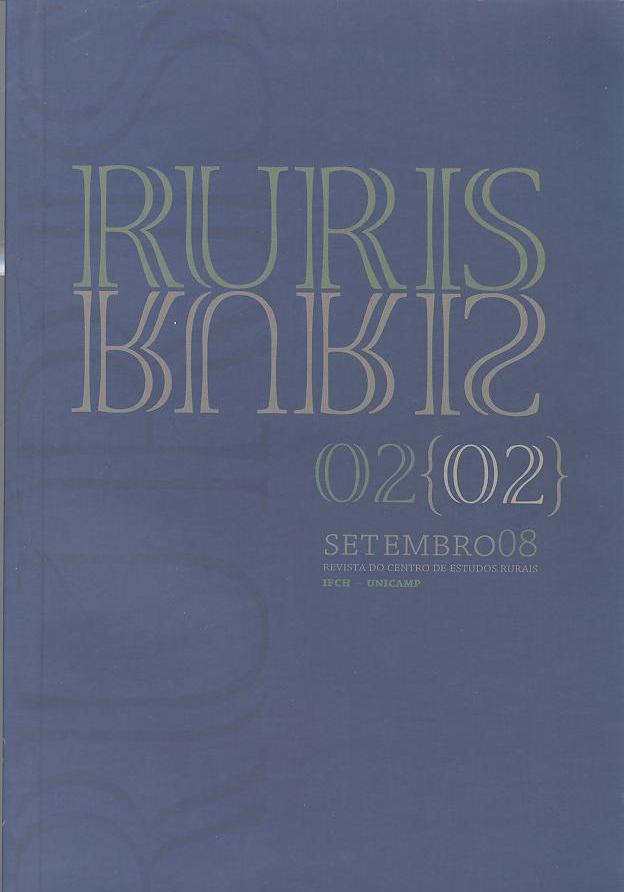Abstract
The purpose of this article is to evaluate how collective action dilemma can be an inhibition factor to cooperative action in a rural community, Assentamento Primeiro de Junho, located in Tumiritinga, Minas Gerais state. The small size and the economic and social homogeneity of their members would suggest, in agreement with the theory of the collective action, that dilemma would not be relevant. However, the main result was that in despite of the availability of social capital, which in theory could favor collective action, there were problems suggesting the presence of social dilemmas of superior order in the community. Collective action dilemma have important implication on development policies. For instance, it has to be implemented selective incentives, such as payment for productivity to overcome economic stagnation.References
AXELROD, R. The complexity of cooperation – Agent based models of competition and collaboration. Princeton: Princeton University Press, 1997.
BARDHAN, P. Irrigation and cooperation: an empirical analysis of 48 irrigation communities in South India. Economic Development and Cultural Change, v. 48 (4), jul. 2000.
BECKER, C. D.; OSTROM, E. Human ecology and resource sustainability: the importance of institutional diversity. Annual Review of Ecology and Systematic, v. 26, 1995.
BIALOSKORSKI NETO, S. Capital social, governança e desenvolvimento da agricultura: um ensaio analítico, 2003. Disponível em: http://www.fearp.usp.br/egna/resumos/bialoskorski.pdf.
COASE, R. [1937] The nature of the firm. Economic, 4, 16. Reimpr. In: Williamson, O.; Winter, S. (Eds.). The nature of the firm – Origins, evolution, and development. Nova York: Oxford University Press, 1991.
COLEMAN, J. S. Foundations of social theory. Cambridge, Mass.: Harvard University Press, 1990.
FINE, B. The development State is dead – Long live social capital?. Development and Change, v. 30, p. 1-19, 1999.
FISCHER, R. A. The use of multiple measurements in taxonomic problems. Annals of Eugenics. 7, 1936, p. 179-188
HARRISS, J.; RENZIO, P. Policy arena. “Missing link” or analytically missing?: the concept of social capital. An introductory bibliographic essay. Journal of International Development, v. 9, n. 7, p. 919-937, 1997.
HUBERTY, C. J. Applied Discriminants. Nova Yorque: WileyIntersciend, 1994.
LEVI, M. Social and unsocial capital: a review essay of Robert Putnam’s Making democracy work. Politics & Society, v. 24, n. 1, p. 45-55, 1996.
MALHOTRA, N. K. Pesquisa de marketing: uma orientação aplicada. Porto Alegre: Bookman, 2001.
MANLY, B. F. J. Multivariate statistical methods: a primer, 2a ed. Londres: Chapman & Hall, 1994.
MAYORGA, F. D. O.; KHAN, A. S.; MAYORGA, R. D.; LIMA, P. V. S. Capital social, capital físico e a vulnerabilidade do sertanejo: o caso das comunidades de Lustal e Sítio Lagoa no município de Taua, Ceará. Revista de Economia e Sociologia Rural, v. 42, n. 1, p. 111-132, 2004.
NASCIMENTO, H. M. Capital social e desenvolvimento sustentável no sertão baiano: a experiência de organização dos pequenos agricultores do município de Valente. 2000. Dissertação (Mestrado em Desenvolvimento Econômico) – Instituto de Economia da Universidade Estadual de Campinas – Unicamp, Campinas.
NORTH, D. Institutions. Journal of Economic Perspectives, v. 5 (1), inverno 1991.
NORTH, D. Economic performance through time. The American Economic Review, v. 84 (3), jun. 1994.
NORTH, D. Institutions, institutional change and economic performance. Nova York: Cambridge University Press, 1996.
OSTROM, E. Collective action and the evolution of social norms. Journal of Economic Perspectives, v. 14 (3), verão 2000.
OSTROM, E.; GARDNER, R.; J. WALKER. Rules, games and common-pool resources. Michigan: Michigan University Press, 1999.
PUTNAM, R. Making democracy work – Civic traditions in modern Italy. Princeton: Princeton University Press, 1993.
TANG, S. Y. Institutional arrangements and the management of common-pool resources. Public Administration Review, v. 51 (1), 1991.
Williamson, O. Transaction-cost economics: the governance of contractual relations. Journal of Law and Economics, 22, out. 1979.
Williamson, O. The economic institutions of capitalism. Nova York: Free Press, 1985.
Williamson, O. The mechanism of governance. Nova York: Oxford University Press, 1996.

This work is licensed under a Creative Commons Attribution-NonCommercial-NoDerivatives 4.0 International License.
Copyright (c) 2012 RURIS (Campinas, Online)

